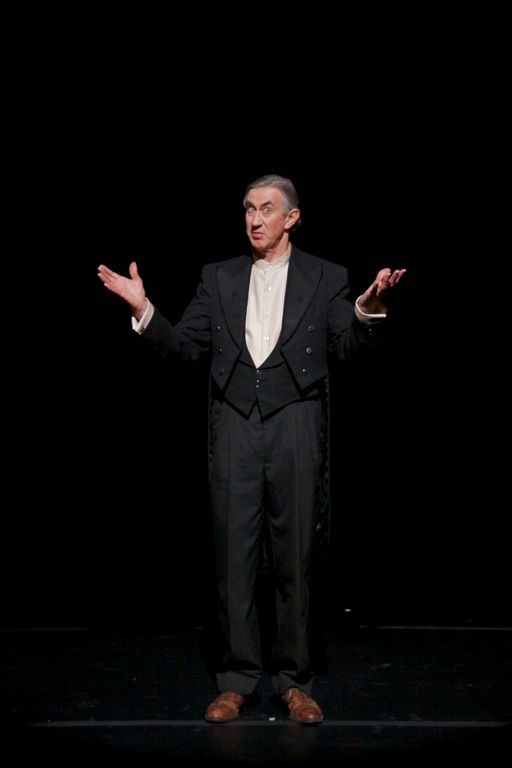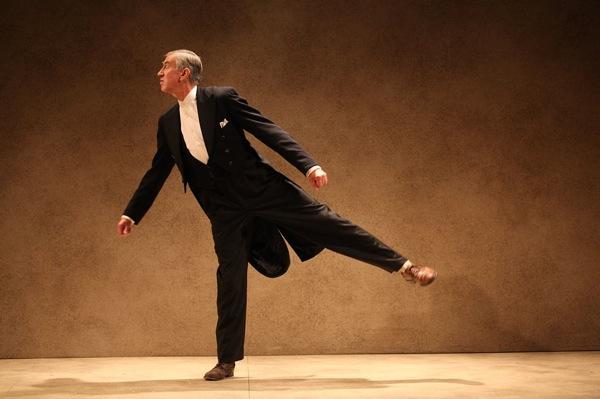It begins with a tall, thin man walking out of light and into darkness. There is much that remains murky in Barry McGovern’s adaptation of this novel by Samuel Beckett, written between 1941 and 1945 when Beckett, who had worked for the Resistance, was in the South of France on the run from the Nazis, and not published until nearly a decade after its completion. Like his later dramatic works, it is preoccupied with profound existential questions – the inconsequentiality of being, the endless groping for meaning – reduced to the simple, immediate and human: the everyday made extraordinary.
This 50-minute stage version, directed with an austere grace by Tom Creed for the Gate Theatre Dublin, and presented as part of the Barbican’s Dancing Around Duchamp season celebrating the avant-garde, can’t match the greatest of the plays for theatrical brilliance. But it has a quiet, desolate loveliness, a largeness of heart and spirit married to a despairing but dogged endurance. And it is beautifully acted by McGovern, a lone figure moving back and forth between light and dark, trapped by our gaze and by his own existence, a long-legged, weary moth, still capable of flutter and flourish.
 In the darkness, McGovern removes his coat and hat and places them on a hatstand where they hang like a lean figure with bowed head. Stepping into a spotlight, he begins a narrative in which first and third person elide, where identities, events and memories are all equally elusive, and which begins with a train journey through a diseased landscape. From the windows, the crepuscular scenery looks ghastly; when the moon rises it is “unpleasantly yellow”. The traveller is Watt – his very name an ambiguity ("what") – and he is on his way to become a servant in the household of a man called Knott ("not"), of whom we learn even less. Of Watt, we hear that his smile is more like a sneer or a yawn; that his mouldering coat is turning green with age, his hat was found and appropriated at a racetrack, his shoes are stiff with seawater, his bags three-quarters empty; and that he gets little peace from the voices in his head.
In the darkness, McGovern removes his coat and hat and places them on a hatstand where they hang like a lean figure with bowed head. Stepping into a spotlight, he begins a narrative in which first and third person elide, where identities, events and memories are all equally elusive, and which begins with a train journey through a diseased landscape. From the windows, the crepuscular scenery looks ghastly; when the moon rises it is “unpleasantly yellow”. The traveller is Watt – his very name an ambiguity ("what") – and he is on his way to become a servant in the household of a man called Knott ("not"), of whom we learn even less. Of Watt, we hear that his smile is more like a sneer or a yawn; that his mouldering coat is turning green with age, his hat was found and appropriated at a racetrack, his shoes are stiff with seawater, his bags three-quarters empty; and that he gets little peace from the voices in his head.
On arrival, he is confounded by the nothingness of his post. There are visits from father and son piano tuners, a pair of twin dwarfs with “a medium-sized dog of repulsive aspect”, and from a fish seller with whom Watt shares tired embraces and intermittent kisses while she swigs her stout. But there is a lack of substance and order to it all that disturbs him; language itself begins to break down, words lose their meaning and with it their attachment to objects and events.
The language is lip-lickingly vivid and precise – Watt, picking his nose, is described as “masturbating his snout”, his longing for linguistic sense is a search for “semantic succour” – and McGovern, eyes bright and startlingly blue beneath bushy black brows, relishes every mouthful of it. He is at once nimble and achingly spent, grave, droll, compassionate and deeply melancholy. It is a stirring performance; and the whole is, in its brutal wit and bleak wisdom, a searing joy.















Add comment